Analysis: Could support for the 'other' Kurds stall Islamic State?
- Published
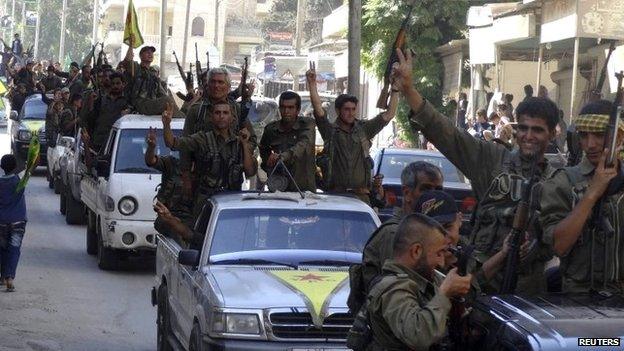
Syrian Kurdish YPG fighters have by standing up to Islamic State for months, with very little outside help
The US and European countries have started arming and co-ordinating with the Kurds to fight the Islamic State (IS). But the Kurds are by no means a monolithic body, raising the question: are Western powers really helping the Kurds who can most effectively take on IS and rescue besieged civilians?
In short, the answer is - by and large - no. The West is officially arming only the Iraqi Kurds, even though Kurdish groups from Syria and Turkey affiliated with a US-designated terrorist group - the Kurdistan Worker's Party (PKK) - are playing an equally, if not more critical, role in the fight against IS.
It is a complicated picture that involves a bewildering list of Kurdish acronyms:
KRG: Kurdistan Regional Government - the official governing body of the semi-autonomous Kurdistan Region of northern Iraq
KDP: Kurdistan Democratic Party - the dominant Iraqi Kurdish party, led by Massoud Barzani
PKK: Kurdistan Workers' Party - Turkish Kurdish party led by Abdullah Ocalan (jailed since 1999)
PYD: Democratic Unity Party - PKK-aligned party in Syria
YPG: Popular Protection Units - PYD-aligned armed force in Syria
Massoud Barzani and Abdullah Ocalan, who espouse competing models of Kurdish nationalism, have been vying to emerge as the pre-eminent leader of the Kurds transnationally.
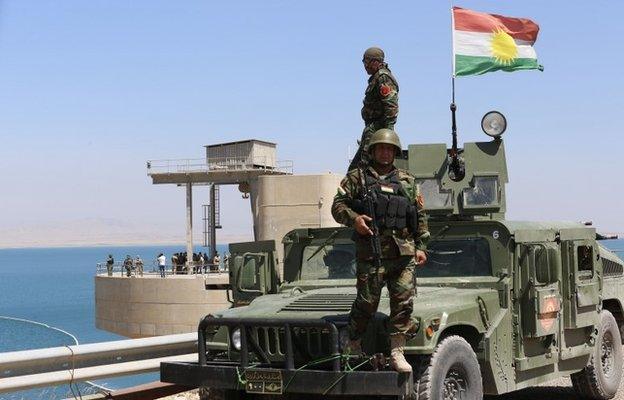
The Iraqi Kurdish Peshmerga have been supported by the US military
They compete in this quest using their domestic influences and proxy parties in neighbouring countries.
Ocalan's model has evidently won out over Mr Barzani's in Syria. The PYD and YPG are the dominant political and military powers in predominately Kurdish north-eastern Syria (known to Kurds as Rojava) respectively.
The YPG has been exceptionally successful in fighting IS, in many cases outperforming the Western-backed Free Syrian Army (FSA).
While IS, formerly known as Isis, has made alarming gains against FSA-aligned groups, the YPG has successfully ousted the jihadist group from Kurdish towns and cities.
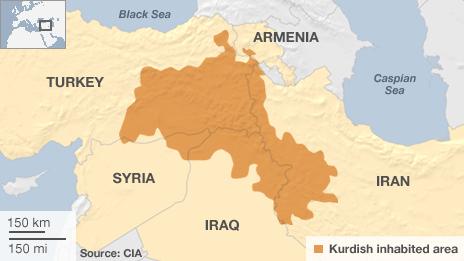
But Mr Barzani in Iraqi Kurdistan has one thing that Ocalan does not: widespread international legitimacy and relatively stable relations with the West.
Perhaps that is why the KDP has expressed its unease with the increasingly prominent role of the PKK-affiliated forces in fighting IS in Iraq and rescuing thousands of Yazidi civilians trapped on Mt Sinjar.
'Will to resist'
Some KDP officials have downplayed the role of the YPG and PKK fighters in these efforts. Yet, according to the testimonies Yazidis who escaped Mt Sinjar, and numerous journalists who visited the mountain, YPG and PKK fighters have played an enormously important part in the rescue and protection efforts.
When asked by BBC's HardTalk earlier this month why Iraqi Kurdish Peshmerga fighters had appeared to melt away when fighting IS in key contested towns, Masrour Barzani, the head of the KRG's National Security Council, responded: "The problem is that the Peshmerga do not have the same kinds of weapons [as IS has] to fight back."
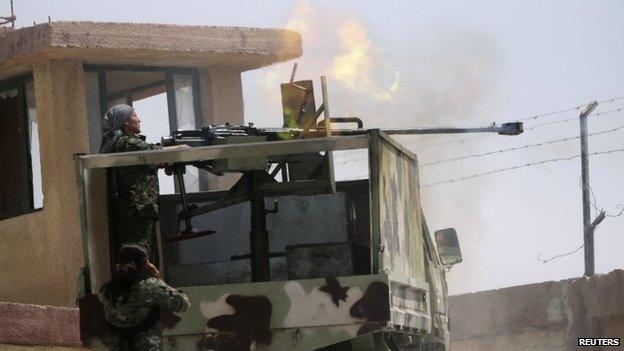
The PYD says YPG fighters are more battle-hardened than the Peshmerga
But according to Alan Semo, the PYD's representative in the UK, weapons are not the most important thing Kurdish forces need - rather, it is the will and ability to fight.
He says the YPG, battle-hardened from its recent experiences in Syria, has the lion's share of that.
"How is it that in three years, the YPG in Rojava with only simple weapons and limited resources, managed to defeat Isis? But in 48 hours, some criminal gangs from Raqqa and Anbar with the support of Baathists took half [of Iraq], the biggest oil refinery, and the second biggest city? he asked.
"The problem is not a matter of weapons… it's about the will to resist."
Key victories
YPG spokesman Polat Can described how the YPG created a safe passage, external from Mt Sinjar into Syria, and transported besieged Yazidi civilians into Kurdish-controlled Syria.
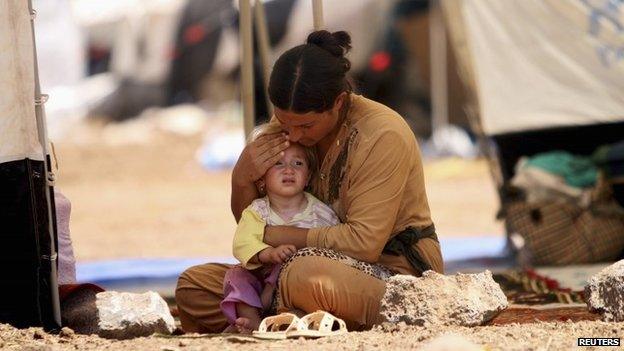
Thousands of Yazidis have been given refuge in Kurdish-controlled Syria
In addition to facilitating the rescue of civilians trapped on Mt Sinjar, YPG and PKK fighters have secured critical victories against IS in Iraq, in particular in Makhmour.
The YPG helped re-secure the Rabia border crossing in June after the Iraqi army - and reportedly some Iraqi Kurdish Peshmerga - fled their posts.
And it was the PKK that recently moved into Lalesh - the Yazidis' holiest site, tucked away in a valley near Dohuk - to ensure its protection.
Kurdish social media is circulating videos, external showing Iraqi Kurds expressing their gratitude to the PKK for its role in defending their cities.
Crucial partner?
For their successes in fighting IS, the US and Europe may consider the YPG and the PKK to be as deserving of international support as is the KRG.
In particular, the YPG could be a crucial partner to the West in orchestrating efforts with the YPG to rescue and protect Yazidis and other minorities at risk of religious persecution in the Sinjar region.
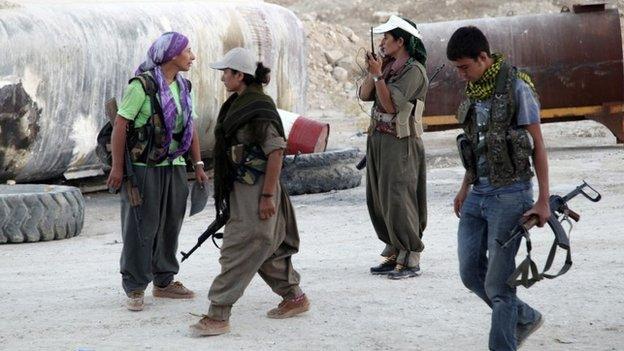
The Turkish Kurdish PKK has been involved in the drive against IS in northern Iraq
Unlike the PKK, the YPG is not explicitly designated as a terrorist group by the US and EU - this implies greater Western flexibility in dealing with the YPG than with the PKK.
Indeed, US officials have hinted that they are considering bolstering the Syrian Kurdish force, external to fight IS in Syria.
The PKK took up arms against the Turkish state in 1984, demanding greater autonomy for Turkey's Kurds. It is regarded by Turkey, the US and European Union as a terrorist organisation because of its attacks on Turkish security forces and civilians
But the PKK and Turkey are now knee-deep in a problematic but promising peace process. The Turkish government now speaks and makes deals directly with Ocalan - there may come a point where Turkey's international allies have to decide whether to do the same.
Cale Salih is a researcher specialising in Iraq, Syria, and Lebanon. Follow her @callysally, external
Mutlu Civiroglu is a Washington DC-based Kurdish affairs analyst focusing on Syria and Turkey. Follow him @mutludc, external